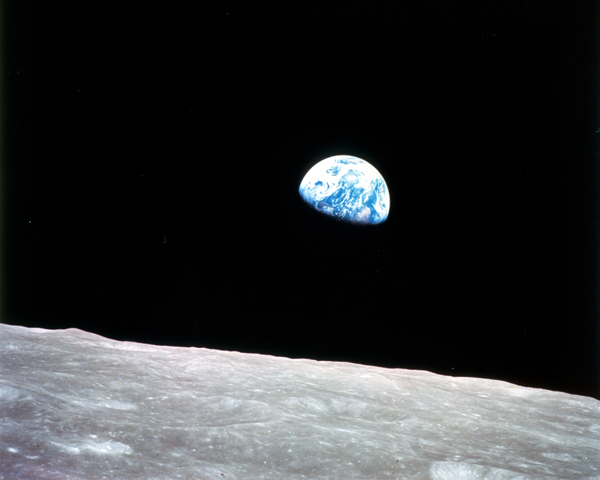New Report: Aliens Will Fix Global Warming... Or Kill Us

If or when intelligent extraterrestrials discover us, it's anybody's guess what they'll do. They might befriend us. They might eat us. As Carl Sagan once noted, they might find amusement in some talent we have that they lack and use us as entertainment, just as we keep sea lions in captivity because of their remarkable ability to balance rubber balls on their noses.
All of these scenarios and more are fleshed out in a new article in the journal Acta Astronautica by researchers at Pennsylvania State University. One possibility they've raised has garnered more attention than any other: An extraterrestrial civilization might notice our planet by detecting changes in the spectral signature of Earth the light radiated by our planet and atmosphere caused by greenhouse gas emissions. And they might frown upon our behavior.
The group's thinking goes like this: From the rate of change of the chemical composition in our atmosphere, the aliens will deduce our rapid expansion and, because of that, possibly view us as a threat, thinking we'll soon pursue resources on other worlds.
"If [they] doubt that our course can be changed, then they may seek to preemptively destroy our civilization in order to protect other civilizations from us," the researchers write. (Several media outlets have inaccurately reported that NASA is behind the new report. One of its authors, astrobiologist Shawn Domagal-Goldman, recently began working at NASA, but wrote the paper with former colleague Seth Baum and others at Penn State, whose institution was solely responsible for funding their research.) [Look! Up in the Sky! A Recent History of UFOs ]
"This is a highly unlikely scenario," Jacob Haqq-Misra, a meteorologist and astrobiologist at Penn State and a co-author of the new paper, told Life's Little Mysteries. "We're not really saying this is going to happen, but it's a possibility. The motivation for explaining this possibility is that we are doing this technology already. We are looking at other planets and their spectral signatures."
Haqq-Misra explained that astronomers are currently capable of detecting spectral changes in light coming from large (Jupiter-size) planets up to 200 light-years away. In galactic terms, this is a very small neighborhood (the Milky Way is 100,000 light years across). However, more advanced civilizations would be capable of seeing much farther. "How far you can see depends on how big your telescope is," he said. "So this is a realistic scenario: What if ET looked at Earth?" [Could Extraterrestrials Really Invade Earth, and How? ]
In fact, we already know what they would see. "People have looked at Earth's radiation reflected back to us from the moon, and you can actually observe the oxygen and methane and ozone in our atmosphere. So we know the spectral signature they would see, and the changes," said Haqq-Misra, whose primary research involves studying the atmospheric changes caused by life.
Sign up for the Live Science daily newsletter now
Get the world’s most fascinating discoveries delivered straight to your inbox.
That aliens would react negatively to seeing signs of our rapid expansion is only one hypothetical outcome, he explained. Perhaps aliens are actually nice. "They might think: These guys are not going to make it. They might need our help."
"But, to delve into some alien sociology, we are extrapolating human civilization to some future point and saying what we might do," Haqq-Misra said. Humans don't work well with others whom we view as a threat. After all, we seem to have killed off all our prehistoric competitors .
Whatever the outcome, the new research is another reminder that you don't survive long in this universe if you can't figure out how to live within your means. "The bottom line is, if there are intelligent civilizations out there, they pretty much have to have figured out how to grow in a sustainable way," Haqq-Misra pointed out. "We're not doing that, and [other civilizations] might make some moral judgment on how we're managing our resources."
- 7 Things That Create Convincing UFO Sightings
- Top 3 Questions People Ask an Astrophysicist (and Answers )
- Are We Alone In the Universe? New Analysis Says Maybe
Follow Natalie Wolchover on Twitter @nattyover. Follow Life's Little Mysteries on Twitter @llmysteries, then join us on Facebook.
Natalie Wolchover was a staff writer for Live Science from 2010 to 2012 and is currently a senior physics writer and editor for Quanta Magazine. She holds a bachelor's degree in physics from Tufts University and has studied physics at the University of California, Berkeley. Along with the staff of Quanta, Wolchover won the 2022 Pulitzer Prize for explanatory writing for her work on the building of the James Webb Space Telescope. Her work has also appeared in the The Best American Science and Nature Writing and The Best Writing on Mathematics, Nature, The New Yorker and Popular Science. She was the 2016 winner of the Evert Clark/Seth Payne Award, an annual prize for young science journalists, as well as the winner of the 2017 Science Communication Award for the American Institute of Physics.










